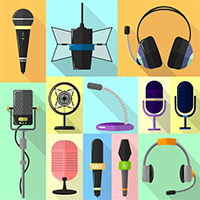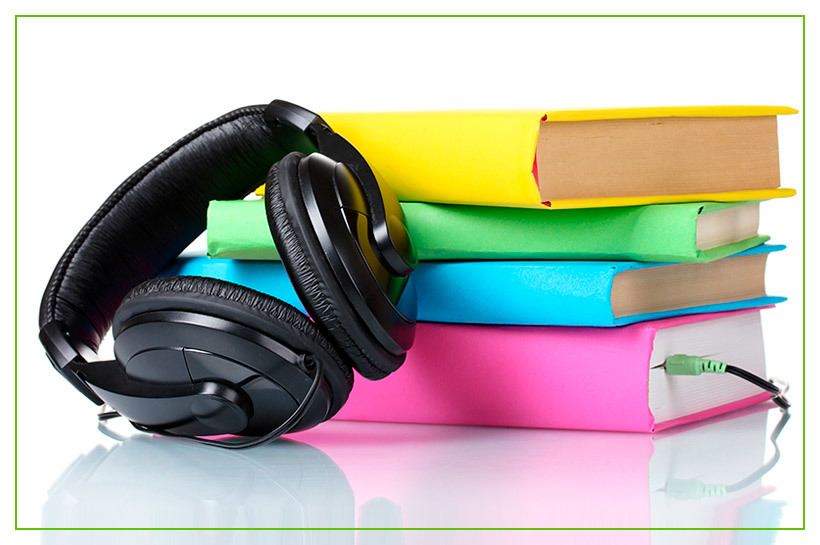Why using audio to get your kids to learn is an easy and convenient way to give them opportunities to become even more well-rounded and well-educated.
In a world full of distractions like YouTube, thousands of different video games, social media, toys, sports, etc., it’s not always easy to get our kids to learn, much less develop and cultivate their interests and skills. But school is enough, right? Wrong. Everyone learns differently-some visually, some are more hands-on learners, and some learn best through audio, which provides a large variety of ways for kids to learn.
With the rise in popularity of podcasts and audiobooks, more and more ways to help kids get get excited about learning and discover new interests are popping up every day. Using audio to help kids learn is an easy and convenient way to give our kids opportunities to become even more well-rounded and well-educated, hopefully resulting in a young person who grows up to love learning.
Here are some ways you can use audio to get your kids to learn so that you can get started right away. They’ll thank you for it!
Using audiobooks to get kids to learn is different from reading with them and is also very different from just sitting them in front of the TV and allowing them to watch shows (even if they are educational). Listening to audiobooks forces children to use different skills than reading and allows for much more imagination than the TV. Children who find reading difficult can also find great relief in being able to listen to a book. Audiobooks are great for car rides, time when children are self-entertaining while you’re cooking dinner, or even for you to listen to together and discuss after. Some ideas of ways to use audiobooks for children’s learning are:
- Find fun stories for themThere are tons of audiobooks for children of fun, engaging stories with colorful language for them to use their imaginations, learn words, get excited about listening to the stories, and want to talk about them after. These can be great conversation starters, so make sure to engage with your child about what you listen to together!
- Provide sketchbooks and crayons or pencilsThis helps them to further utilize their imagination. While they’re listening, they can draw what they think their favorite characters might look like, strengthening their creativity and encouraging them to use a part of their brain that looking at pictures in books doesn’t activate.
- In the case of children who find reading difficult, audiobooks can be a tremendous reliefKids can keep up with their schoolwork easier and also become more confident in their reading abilities by listening to an audiobook at the same time that they’re following along with a print or digital version of the book. By engaging more than one of their learning senses at the same time, the brain can integrate the information with more ease.
- Be close by to answer any questionsIn order for an audiobook to really be engaging and educational, you’ll want to make sure you can define unknown words for them, answer questions about the story as it unfolds, or even just listen to their excitement as they tell you all about what they’re listening to.
More than half of people in the US listen to podcasts weekly, and yes, they can be used for children as well. Many people think that podcasts are always about business or politics, but there are a ton of different podcasts that exist, and many of them are for children! Some teachers utilize podcasts in their classrooms, and you can use them at home to get your kids to learn, too. There are book club podcasts for kids, science ones, fictional stories, and so much more. Podcasts can be utilized similarly to audiobooks to help kids learn, but they can also be used in the following ways:
- Podcasts offer the advantage of being shorter, and once your child finds one they particularly like, there are usually a whole slew of episodes from that one podcaster from which they can choose.
- You can have them create their own podcasts! – Free podcast recording software might not be good enough quality to publish, but it IS good enough to encourage your kids to research topics they like or write their own story. Help them record it, have fun with it, and listen to it as a family (or with friends) later. They’ll have something they’re proud of, and it will encourage them to delve further into their interests and passions. It also encourages a use of words that children usually aren’t otherwise engaging.
- Podcasts are free and easy to download. Put them on your phone, tablet, or even on your computer.
Long story short, there are SO many options when it comes to using audio to help children to learn, and create the beautiful “side effect” of giving you and your kids great conversation topics to explore together. While we still greatly encourage and recommend that you read with your kids and have them read any and all types of books, podcasts and audiobooks are a great addition to any child’s learning and language skills. They’re also an excellent resource for children with learning challenges. Audio teaches all kids to listen for things to talk about later, to develop their imaginations, and develop the ability to ask engaging questions.
Do you have a favorite audiobook or podcast that would be great for kids or families?Please share in the comments, and have fun learning!
Have thought of publishing your audiobook?

Create a Professional and Profitable Audiobook!
The Insiders Guide to Audiobook Production gives you the inside track to create a high-quality and effective audiobook and reach a much larger new audience.
Thank you!
Please check your inbox for your email.
If you don't see anything in a few minutes, please check your spam folder.

